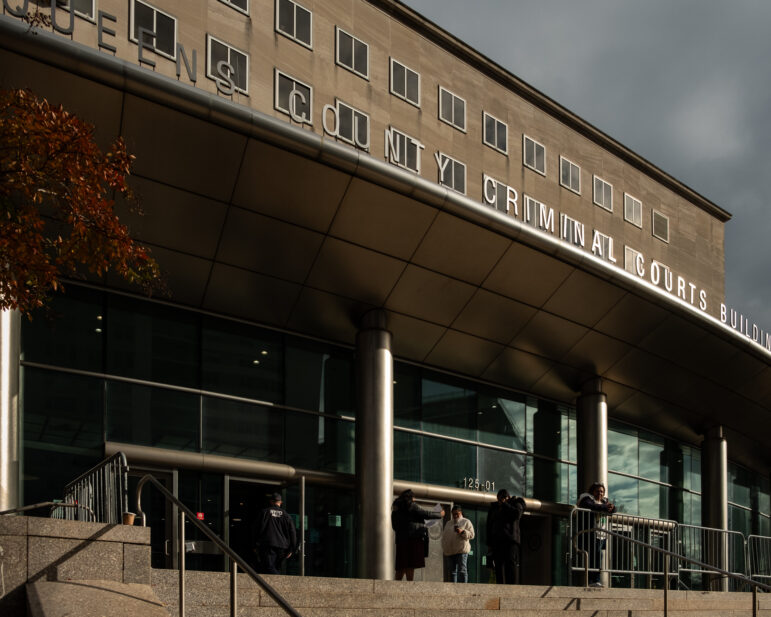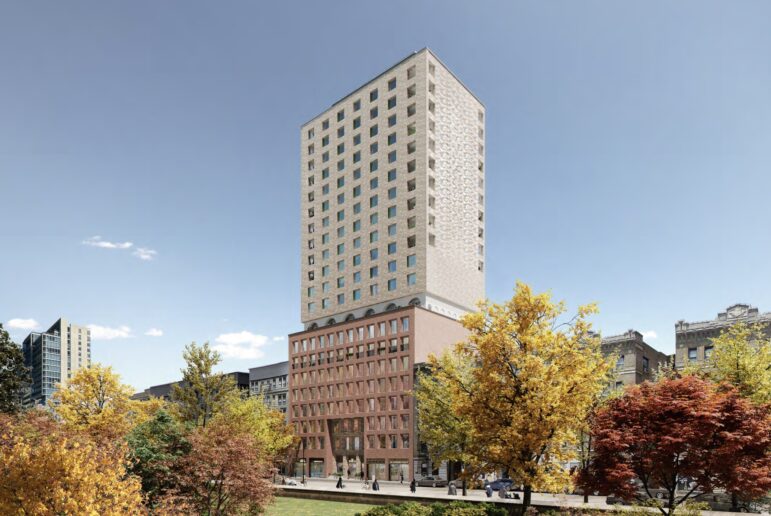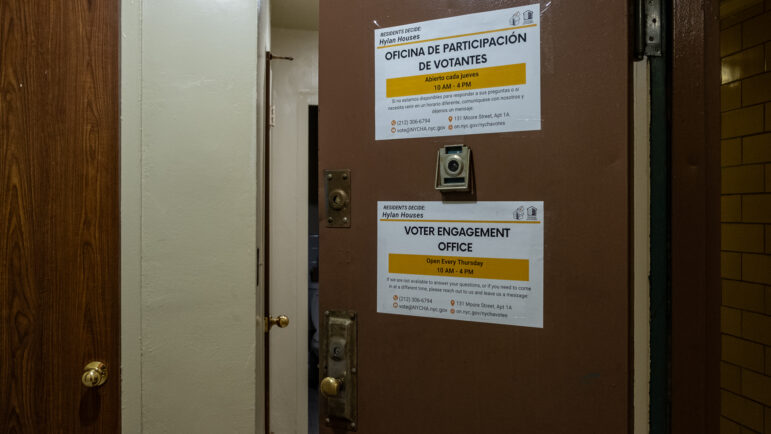The imminent closure of two city-funded day care centers is sparking fierce resistance among parents, employees and advocates, who say the Administration for Children’s Services (ACS) should not be removing affordable child care options from low-income communities in need of such services.
The facilities set to close—Lucille Murray Child Development Center in the Mott Haven section of the Bronx and Children’s Liberation Day Care Center in Manhattan’s East Village—will join a total of 15 other ACS centers that have shut down since 2004, according to an analysis of the ACS Contracted Child Care Program Directory by District Council 1707, a union representing many childcare workers.
“We must not allow city day centers providing educational and support services for young children to be closed,” DC 1707 executive director Raglan George Jr. said in a statement last week.
City-funded day care centers are shut down for various reasons, from financial mismanagement and disrepair, the reason ACS says it’s closing Lucille Murray – to building renovation and conversion, which is what’s happening at Children’s Liberation. But according to the union’s research, the most common reason for closing was “under-enrollment,” when centers are not operating at full capacity. A total of nine centers did not serve enough children to meet their ACS-contracted targets, and were therefore not financially or programmatically feasible.
ACS spokeswoman Sheila Stainback says her agency does not close centers for under-enrollment alone, however, and there are often other factors at play. “If a program cannot attain full enrollment, possible outcomes can include a reduction of slots and budget, or conversion of slots to serve younger age groups,” Stainback said.
Under-enrolled centers that were shut down are among the most expensive facilities to maintain, as they operated under direct leases between the city and landlord, says child care policy consultant Suzanne Reisman. Not only do direct lease centers traditionally allocate more space per child than centers leased by day care organizations themselves, but their cost per square foot is also significantly higher. “These [closings] aren’t rash decisions made just to save $2,” Reisman said.
It hasn’t been a hasty decision at Children’s Liberation – determining the center’s fate has taken years. It’s a unique case in that the center is part of a complicated struggle over the future of its building, the P.S. 122 community and arts center on First Avenue and East 9th Street. But it’s similar to others in that Children’s Liberation’s closure would seem to leave a void in local services. According to Paul Wilson, parent of a child at the center and a member of the sponsoring board of directors, if the program closes this summer as planned, there will be no publicly-funded child care centers in a sizable swath of Manhattan (14th Street south to Houston Street, Fifth Avenue east to Avenue C).
ACS welcomes Children’s Liberation moving to a new location, Wilson said, “But where are we going to get 7,300 square feet and a play yard for $5,500 a month? That’s renovated and ready to move into? Anyway, this is our rightful home.” There is one aspect of the center that ACS would like to duplicate, according to Stainback – the leasing structure of having the day care center, not ACS, contract with the landlord.
Some advocates remain puzzled by the low enrollment figures claimed by ACS. They point out that the agency itself acknowledges only serving less than one-third of the estimated 275,000 children under 6 from low-income families. “The reality is that in every district there are always going to be pockets of poverty,” says Sandy Socolar, senior policy analyst at DC 1707. While centers are closing, there remain a large number of children who could benefit from their services, which are offered on a sliding scale related to the family’s income.
Just look at the situation in Mott Haven, advocates say. When Lucille Murray closes this Friday, it will become the fourth ACS day care center to shut down in that neighborhood in as many years. The previous three closings had to do with under-enrollment, which ACS said was a result of changing demographics. Yet Mott Haven has the lowest median household income and highest poverty rate in the city, according to NYU’s Furman Center. A DC 1707 analysis estimated that 5,900 Mott Haven children under age 6 are income-eligible for ACS child care. But after Friday, the neighborhood will have lost more than 400 pre-school slots due to day care center closings. The apparent disparity between need and supply has led public advocate Betsy Gotbaum to call for a moratorium on closing city-funded day care centers.
So how can there be under-enrollment at day care centers in areas like Mott Haven, where there is clearly a need for affordable child care? ACS maintains that the shortage is mostly the result of fewer income-eligible children and the abundance of other preschool and day care services in some neighborhoods. But analysts argue that under-enrollment is a more complex issue with many contributing factors.
In an Oct. 2007 report, the Federation of Protestant Welfare Agencies (FPWA) explored some of these factors and concluded that under-enrollment does not always signify a lack of need, as ACS had argued – but it can point to a lack of information and outreach. “Center vacancies do not automatically mean that the City’s obligation to families in that community has been fulfilled,” the report noted. Rather, under-enrollment is often the result of administrative burdens at ACS and a shifting child care landscape in the city as a whole.
In his job as director of the Morris L. Eisenstein Learning Center in East New York, Edward Hawkins says he’s noticed ACS paying a lot more attention to enrollment numbers. “They’re really looking closely at attendance now, making decisions without talking to employees and unions,” Hawkins said. He claimed his program, which is part of the United Community Center, usually has 99 percent enrollment. But when it recently dipped to 90 percent, “I had to go meet with 10 people at ACS.”
ACS has acknowledged some of the barriers to enrollment and says it is addressing them with its “Full Enrollment Initiative,” the goal of which is to open more access points to families applying for child care. Day care providers are now encouraged to determine families’ eligibility on-site, and ACS is working to simplify enrollment and recertification procedures. As a result of these and other efforts, ACS has filled more than 1,000 day care slots since Dec. 2005, according to Stainback.
And because many children now use services offered at public schools—such as kindergarten and after-school care—rather than attend a day care center, ACS is offering new programs of its own to attract more children. For example, Stainback said ACS is looking to “age down” certain locations by serving infants and toddlers, and is starting to provide universal pre-kindergarten services at some centers.
Fatima Goldman, executive director of FPWA, sees this as a worthy effort with many challenges ahead. “Child care programs face many barriers in taking on the care of younger children, including refitting classrooms, training staff, and acquiring age-appropriate equipment,” Goldman said. “Providers will need facilities funding and technical assistance in order to successfully implement the programmatic changes associated with ‘aging down.’”
In the meantime, ACS will refer children attending the two centers scheduled to be shut down to other providers. In a statement regarding the upcoming Mott Haven closing, commissioner John Mattingly said, “All of the children who attended Lucille Murray DCC will be transferred to other ACS-contracted programs in the general community, or their parents will be issued vouchers to find private child care.” Some families have already made the switch. For example, according to a staffer at the ACS-funded Pamela C. Torres Day Care Center in Mott Haven, two children from the Lucille Murray center recently enrolled at Torres and another 10 families have visited the site.
Others will likely have to rely on a large network of private care providers located throughout the South Bronx. “The change will be uncomfortable for the kids,” said City Councilwoman Maria del Carmen Arroyo, who represents Mott Haven and surrounding neighborhoods. “But the centers do excellent work and have the capacity,” she said of private programs.
One possible alternative is Ready, Set, Grow!, a private day care provider only a couple of blocks from the Lucille Murray center. Director Nurita Love was not aware of the upcoming closure, but said her center has five open spaces, and will have many more when a new branch opens later this month.







